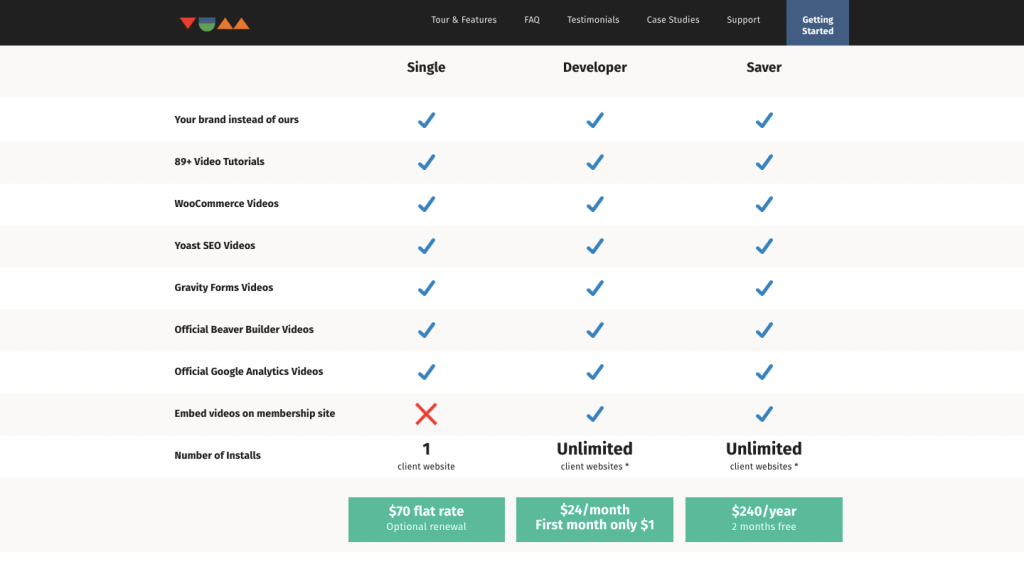It’s a new year and it’s time for a new product.
What’s that, you say? You don’t sell products? Well, why not?
Trading time for money when selling WordPress services is an inefficient way to make money.
Not only does it teach your clients that the value of what you do comes from how much time you spend on it (instead of the results you deliver), but it also caps your earning potential. You will never be able to make more than what a 40-, 50- or 60-hour workweek allows for.
Now, if you were to turn your service into a product, that’s a whole different story.
In this guide, I want to delve into why you should turn your service into a product or why it’s time to think about building a new product from scratch. If you’re sitting there, scratching your head about how you could do that, don’t fret. I’ve included a list of 18 ways you can turn your WordPress service into a product for 2019.
1. Website Development
2. Consulting
3. Maintenance Plans
4. Website Audit
5. Website Edits & Support
6. Educational Materials
7. Develop Your Own Plugin
8. Themes & Templates
9. Design Marketplace
10. Marketing Audits
11. Content Creation
12. eBooks & Other Research
13. SEO
14. Social Media Management
15. Email Marketing Management
16. Google AdWords Management
17. Competitor Analysis
18. Reputation Management
Why You Should Turn Your Service Into a Product.

“First, I conduct a rigorous competitive analysis and keyword research. Then, I move into wireframing and UX development.
Yada yada yada.”
The prospect’s eyes glaze over or, worse, they wave away what you’re saying.
Whether they come right out and say it, what they’re thinking is:

Do you know why that is? It’s because what they really want to know is:

Obviously, clients expect you to be qualified and to produce good work. But they don’t need to know the nuts and bolts of it. That’s why they’re paying you to take this off their hands. Plus, it’s all gibberish to them anyway.
What they want to know is what the end result will be.
Which is why productising a service makes a lot of sense for WordPress consultants and services. To break it down:
- You stop wasting time trying to explain how you build a WordPress website or how your SEO work gets their website to the first page of search results.
- You also stop wasting time trying to be a Jack-of-all-trades, constantly forcing your brain and body to go in a million directions at once.
- Your complex service becomes easier to sell as it’s more clearly and succinctly labelled, prioritising the value of the product and not the work behind the service.
- You package up your service into a neat little box, put a bow on it and sell it at a flat rate to clients en masse. Your earning potential is no longer capped.
- You can charge more for it, too, since you can deliver results in a much shorter time frame than if you took on work piecemeal.
- With repeatable systems and products ready to go out-of-the-box, you can teach and delegate this work to other team members.
- It becomes easier to retain a base of good clients over the long term.
Ultimately, the goal here is to spend less time providing a service, but still increase your profits. Now, it’s up to you to figure out how to turn your service into a product that sells.
18 Ideas to Turn Your WordPress Service into a Product That Sells
There are three keys to profitability with a WordPress business:
1. Repeatability
2. Teachability
3. Scalability
If you’re a WordPress consultant that has struggled with building and sustaining profitability, that needs to stop now. You probably have a WordPress service you can turn into a product. You just need to know what to do with it.
So, let’s talk practical applications of this. Here are 18 ideas for ways to turn your service into a product:
1 - Website Development
If you think about it, the development of WordPress websites is already a productised service… if you’ve built your process the right way.
In other words, with most of the administrative work, communication and project management streamlined by automation — or delegated to someone else – this isn’t a job that requires your manual labour or input every step of the way. It’s also not one you have to think much about since your tools, processes and checklists seamlessly guide you through the workflow each time.
So, start billing this as the product that it is! Here’s an example from don, a creative design agency, to get you started:
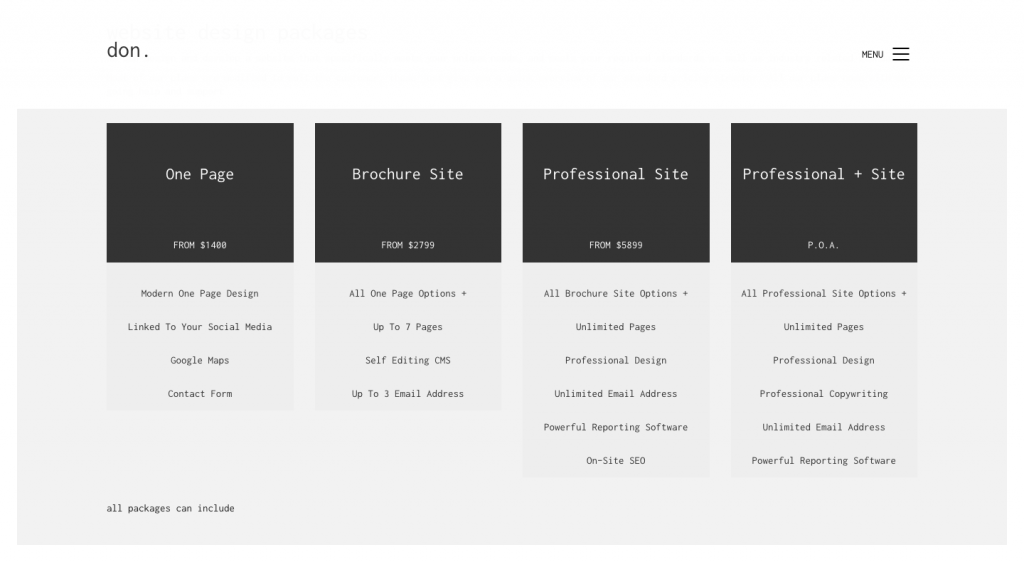
2 - Consulting.
WordPress consulting is another type of service you provide that could easily be productised. There are three ways in which you can offer WordPress consulting:
1. DIY (which I’ll provide examples of down below)
2. One-on-one
3. Group
Each of these methods allows you to put a price tag on your service as a whole. Clients won’t be counting the hours spent with you or on their own, nor will they get caught up in individual lesson plans. You’ve promised a clear outcome and that’s what they’re working towards.
Here is a great example from Piccia Neri:
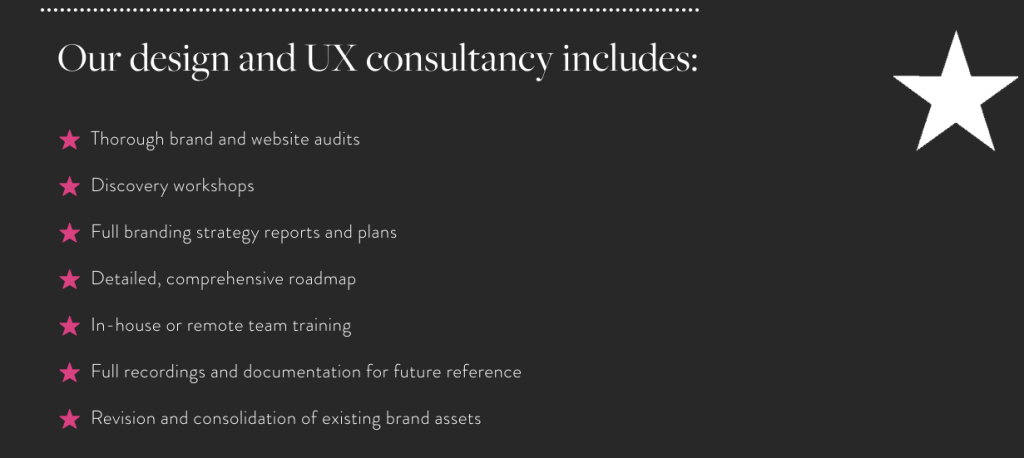
3 - Maintenance Plans
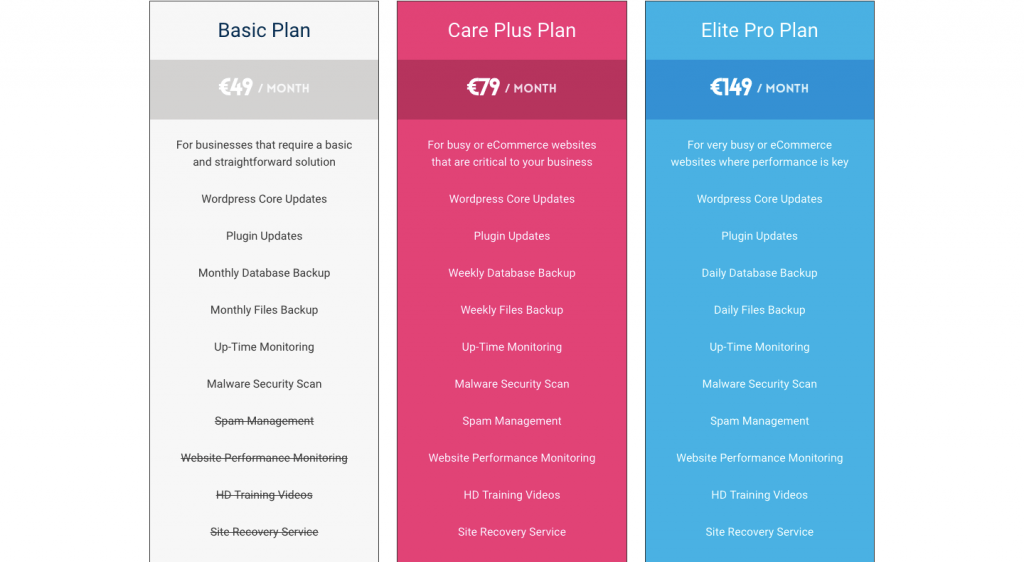
4 - Website Audit.
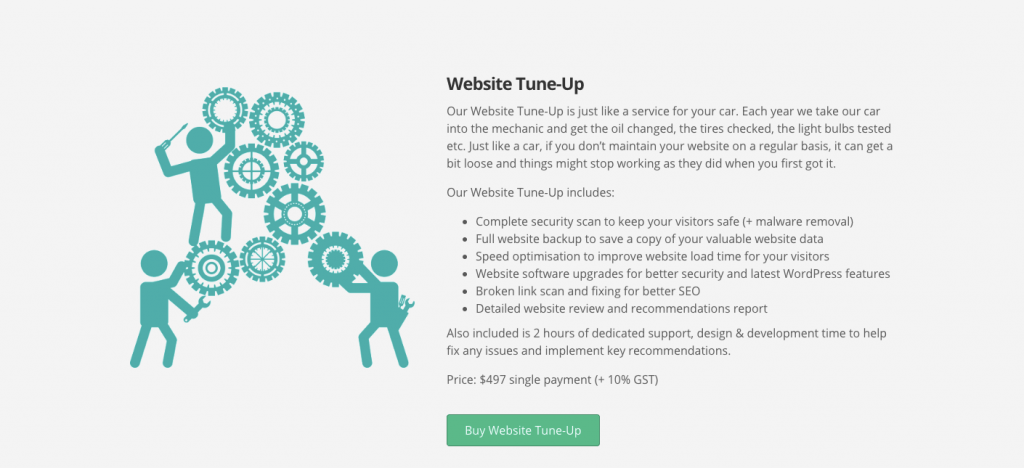
5 - Website Edits and Support
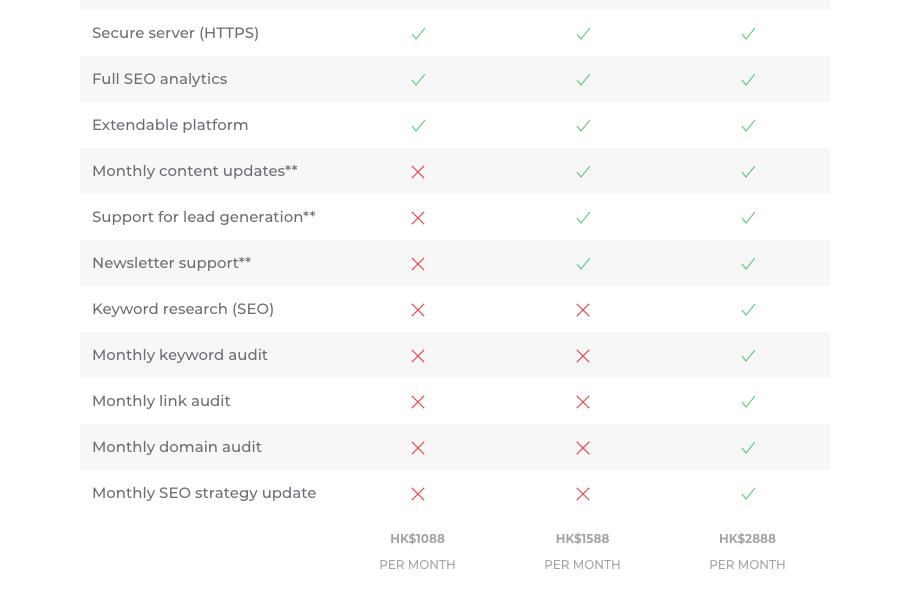
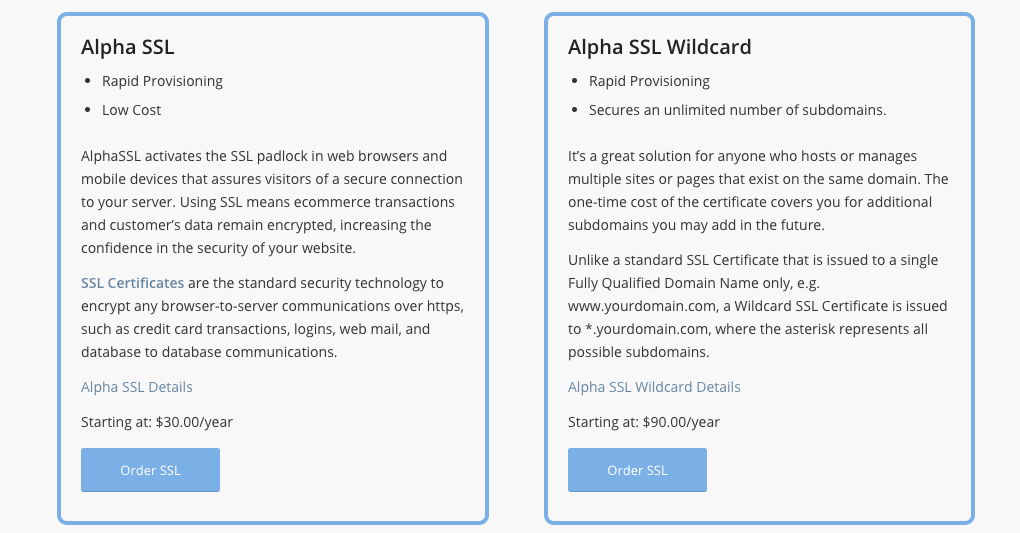
6 - Educational Materials.
If you’re like me, then you enjoy passing knowledge onto others, so they can take the ball and run with it. In that case, the development of an educational program such as our Blueprint Program could be a good choice for you. If you want the abridged version of this course, don't miss our free workshop where you'll learn how to get better clients, better projects and better fees.
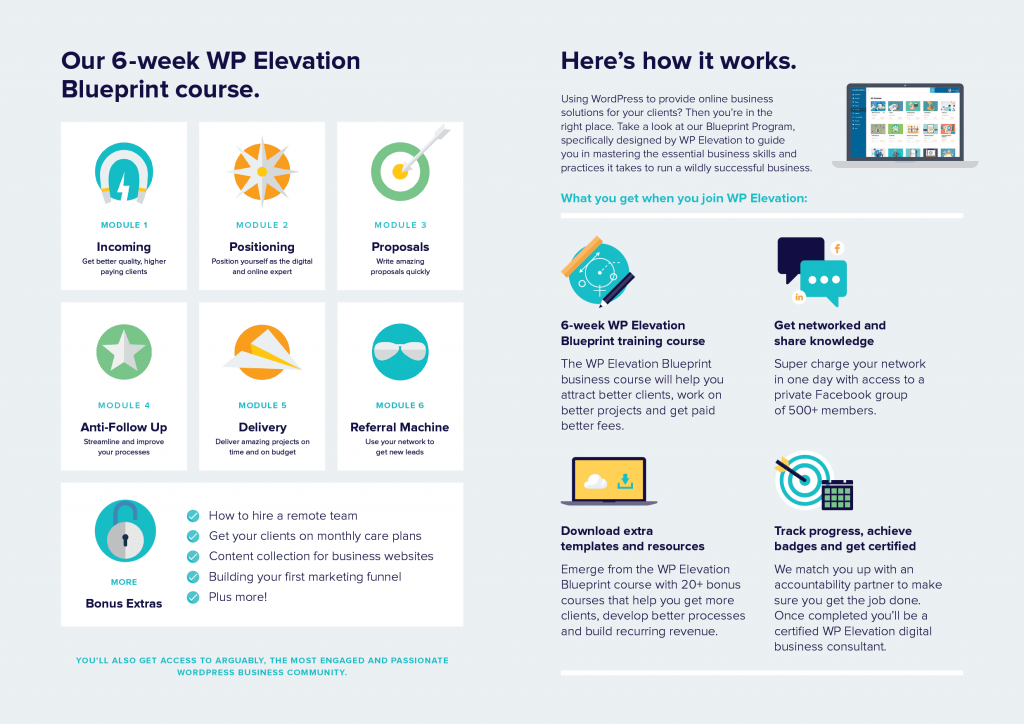
- Record yourself performing a task or working through a process in WordPress. Sell the video tutorial.
- Develop a short WordPress training course. It could be an add-on to web development services or you could offer it to new developers wanting to learn best practices on their way up.
- Film exclusive webinar training sessions. Sell the copies afterwards to those who missed it the first time around.
7 - Develop Your Own Plugin.
Early on, I recognised a need for WordPress help videos inside of WordPress. The Codex is a decent resource, but WordPress really does nothing to help users get started once they’re inside the CMS.
As such, I wrote a manual and was giving it to my web consultant clients. But I found that no one was using it. So, I thought:
“Why not put this inside of the WordPress backend?”
So that’s how the plugin came to be. I converted the physical manual into videos and now use the plugin to embed those help videos into the backend of customers’ WordPress installations.
Pretty cool, huh? It was something I created once and now I sell it 24/7 without an iota of input from me. If you have an idea for a plugin that would revolutionise the way your audience works in WordPress, give it a shot. It’s a worthwhile venture.
8 - Themes and Templates.

The website includes a number of upgrades and add-on packages that make this an even more valuable theme purchase for users. So, rather than put the focus on building custom websites from-scratch, The Blog Spa offers custom add-ons that really help make a customers’ website stand out.
9 - Design Marketplace.
- Photography
- Illustrations
- Logos
- Videography
- Iconography
- Typography
- Audio
- And more
10 - Marketing Audits.
11 - Content Creation.
- Create a content creation care plan.
- Provide proofreading as a service with a monthly retainer (it’s basically like website support, but focused strictly on blog content).
- Sell your production team’s services as Matt Johnson does.
12 - eBooks, White Papers and Other Research
As the Video User Manuals plugin story demonstrates, a digital or paper guide isn’t always the best way to get a product into your customers’ hands. That said, what worked for me might not be the solution for you – especially if you have plans to create a lengthy guide that targets people who don’t work inside a dedicated software platform like WordPress.
If you enjoy the process of crafting guides for your users, and you don’t really like the process of providing information in person or over video, eBooks and white papers could be a good choice.
What’s nice about this is it gives you the chance to sell add-ons, too. That’s the beauty of creating content. There’s always some offshoot idea you can explore in another book or offer as a companion piece (such as worksheets or checklists to help them through the guide).
13 - SEO
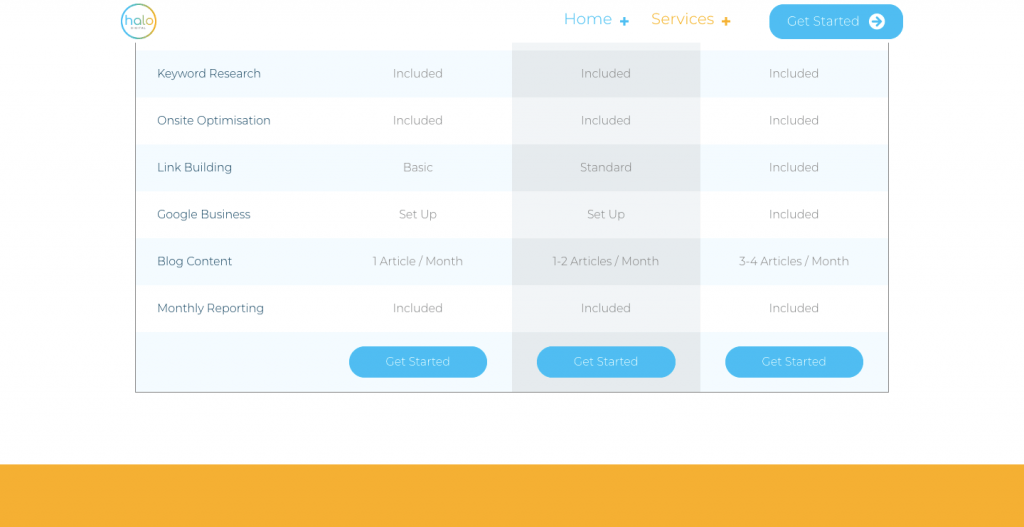
As you can see, the first part of their SEO packages revolves around traditional WordPress care services: uptime and security monitoring, edit requests, etc. While a WordPress consultant understands that these contribute to the whole SEO picture, your clients might not understand the value in that… which is why providing more explicit SEO services like these is a brilliant move:
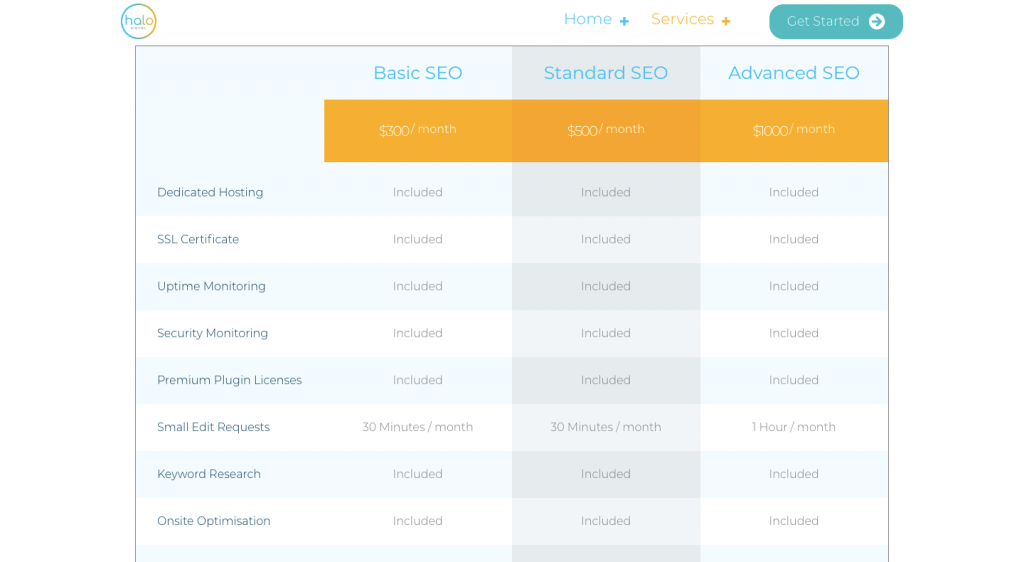
You can also sell this product separately. However, if you find it hard to convince clients to pay a monthly SEO retainer, this is a good way to get your foot in the door.
14 - Social Media Management
Whether you understand the constantly changing social media landscape well or you have a team member or partner you can outsource to, social media management is another way to turn a service into a product.
The Digital Maven has carved out a number of social media management plans for clients.
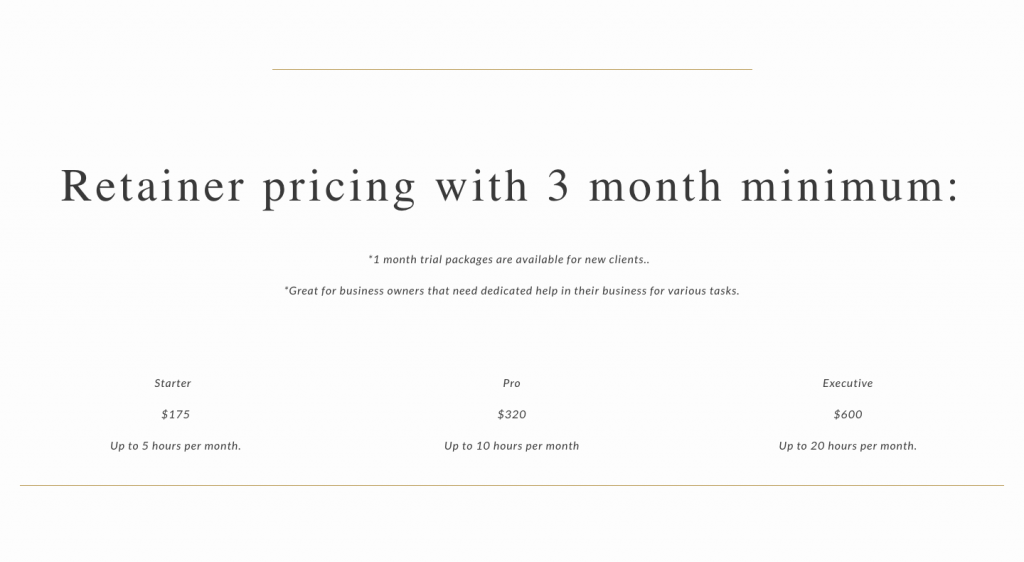
Each plan offers the same services. The difference between each, however, is in how much time The Digital Maven dedicates to the clients’ accounts. That’s one way to handle it.
Another would be to develop monthly plans based on the kind of social media management offered. For instance, if an entrepreneur is attempting to move into influencer marketing, you might have a social media management plan carved out specifically for that.
Again, just think about your target audience and how to communicate the most value in terms of how you define your plans.
15 - Email Marketing Management
Email marketing is another avenue to consider pursuing.
What’s nice about this one is it integrates so well with WordPress and there’s also a significant design piece to it, too. So it’s not too far of a stretch for a web designer to offer something like email templates (productised the way you would a theme, of course) or to manage the lead generation funnel through a client’s plugin and email marketing tool.
16 - Google AdWords Management
Let’s not forget about pay-per-click marketing. Even if you do the most outstanding job in building a client’s WordPress website or optimising it for organic search results each month, at some point, they need to pay-to-play.
Google AdWords can be a complicated tool to navigate – especially if your clients don’t have an understanding of audience development or don’t want to take the time to – so this could be a lucrative product offering.
Marketing Clinic has carved out a speciality package for this:
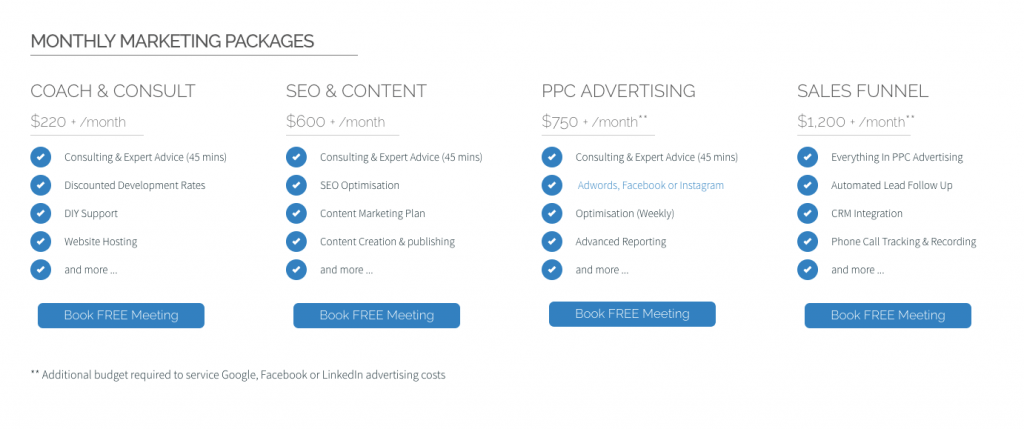
As you can see, this is a nice companion product to other website and search optimisation solutions.
17 - Competitor Analysis
Something your clients spend a lot of time thinking about is the competition. Practically speaking, though, they probably don’t know what to do with that focus.
A competitor analysis is similar to other auditing services. Essentially, you survey the landscape of competitors and learn everything you can about what works and what doesn’t for them. This will be even easier if you specialise in one niche and are already familiar with the competition.
Then, you provide an analysis that shows how your client stacks up against them. This is a good way to establish a reputation as an authority in the space and, later, sell these clients on web development or SEO services.
18 - Reputation Management
This last idea is one many people don’t think about, though it’s becoming ever more important as Google reviews litter search results pages.
Which of the following sites are you most likely to check before visiting a business?
As you can see in this ReviewTrackers online reviews survey, Google is the primary platform people turn to before they visit a business (or website).
Pay attention to what ReviewTrackers’ analysis says:
“Seeing as how most website traffic comes through Google, Google effectively preempts other review sites by showing its own star ratings to users before they can click through to their search result. Sneaky, huh? Google has effectively cut in line, jumping ahead of the major players in the review industry.”
Phil Singleton understands this – he even talked about his Google review funnel in podcast episode #156. Simon hosted a webinar with Phil (that is available to WP Elevation members in the member area of our site) in which he expands on how he uses review funnels to build his business.
As for what you can do with this, your goal is to develop a product that targets Google’s review-friendly property (Google Places), tools (schema markup) and then monitor and manage the reviews that come through. Once you’ve gained your clients’ trust in providing other services and products, then reputation management will be a breeze.
Wrap Up.
Think of what you do most frequently in your business and which of your services clients gravitate towards most. Does it have a repeatable process? Is it something you could turn into a singular product and then sell over and over without having to recreate anything each time?
In that case, my friends, you already have a way to grow your freelance business with predictable products. You’ve simply got to start selling it that way.
If you're interested in this topic, I delve further into this in our free webinar. Click here and join today.
Do you have something neatly packaged up that you’ve built for your own purposes, but haven’t thought to share with others?
If you’ve found a way to successfully turn your service into a product, leave a note in the comments below or join the Digital Mavericks Facebook group and share it with us there.


